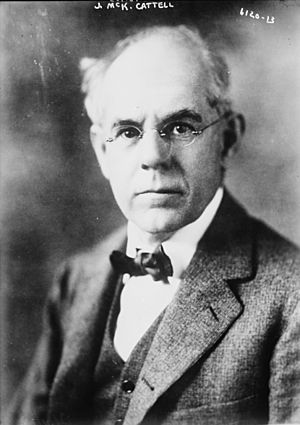James McKeen Cattell facts for kids
Quick facts for kids
James McKeen Cattell
|
|
|---|---|
 |
|
| Born | May 25, 1860 Easton, Pennsylvania, U.S.
|
| Died | January 20, 1944 (aged 83) Lancaster, Pennsylvania, U.S.
|
| Alma mater | Lafayette College (BA, MA) University of Leipzig (PhD) |
| Scientific career | |
| Fields | Psychology, psychometrics |
| Institutions | University of Cambridge University of Pennsylvania Columbia University |
| Doctoral advisor | Wilhelm Wundt |
| Doctoral students | Walter Dearborn Harry L. Hollingworth Shepherd Ivory Franz Edward Thorndike Edward Kellog Strong Jr. John Dashiell |
| Spouse(s) |
Josephine Owen
(m. 1888) |
| Children | 7, including Psyche |
| Parent(s) |
|
James McKeen Cattell (born May 25, 1860 – died January 20, 1944) was an American psychologist. He was the first professor of psychology in the United States. He taught at the University of Pennsylvania.
Cattell was also a long-time editor and publisher of science magazines. One famous magazine he worked on was Science. At the start of his career, many people didn't see psychology as a serious science. Cattell helped make psychology a respected field of study. He is also remembered for being against the United States joining World War I.
Contents
Early Life and Education
James McKeen Cattell was born in Easton, Pennsylvania in 1860. He came from a rich and well-known family. His father, William Cassady Cattell, was a minister and became president of Lafayette College. James's uncle, Alexander Gilmore Cattell, was even a senator for New Jersey.
Cattell went to Lafayette College when he was 16. He studied English literature and was very good at mathematics. He graduated with top honors.
Later, Cattell went to Germany for more studies. He worked with Wilhelm Wundt at the University of Leipzig. Wundt is often called the "father of psychology." Cattell was the first American to publish a psychology paper there. His paper was about measuring mental processes.
Building a Career in Psychology
After finishing his studies in 1886, Cattell taught at the University of Cambridge in England. He also visited the U.S. to give lectures. In 1889, he came back to the U.S. to become a psychology professor at the University of Pennsylvania.
In 1891, he moved to Columbia University. There, he became the head of the Psychology, Anthropology, and Philosophy departments. In 1895, he was chosen to be the president of the American Psychological Association.
Cattell worked hard to make psychology a serious science. He believed that the human mind could be measured, just like things in chemistry or physics. He brought new ways of testing the mind to the U.S. These methods came from scientists like Wilhelm Wundt and Francis Galton.
Challenges and New Ventures
In 1917, Cattell lost his job at Columbia University. This happened because he spoke out against the U.S. government's policy of drafting soldiers for World War I. He later sued the university and won some money.
In 1921, he used this money to start a company called The Psychological Corporation. He wanted to use psychology to solve real-world problems. He also owned a printing company to publish his scientific journals. He continued working on these journals until he died in 1944.
Beliefs About Human Traits
Like many scientists of his time, Cattell was interested in eugenics. This was a belief that people could improve the human population by choosing who had children. Cattell was influenced by Charles Darwin's ideas about evolution. He focused on studying how people are different from each other.
Cattell believed he had "inherited ability" from his family. He also thought his environment helped him succeed. He even offered his own children money if they married someone whose parent was a university professor.
Mental Tests and Their Impact
Cattell was very important in bringing mental testing to America. He wanted to measure simple mental processes. He studied things like how fast people reacted and how well they remembered things. He was the first to use the term "mental tests" for these types of measurements.
At Columbia University, all new students had to take Cattell's tests. He thought these tests measured intelligence. However, in 1901, one of his students, Clark Wissler, showed that the test scores didn't predict how well students did in school. Later, Alfred Binet developed better ways to measure intelligence.
American Men of Science
Cattell was the first person to put together a book called American Men of Science in 1906. This book listed important scientists in America. Even though it was called "Men of Science," it included some women scientists too.
Skepticism About the Paranormal
Cattell was a skeptic when it came to claims about ghosts or psychic powers. He thought that many such claims were not real. He even had a public discussion with another psychologist, William James, about psychic research. Cattell believed that studying such things could harm the reputation of psychology.
Family Life
James Cattell married Josephine Owen in 1888. They had seven children. Their children were taught at home by their parents before college. The whole family helped Cattell with his work on scientific journals.
One of his daughters, Psyche Cattell (1893–1989), also became a psychologist. She created tests to measure the intelligence of babies.
Death
James McKeen Cattell passed away on January 20, 1944, in Lancaster, Pennsylvania.
See also
 In Spanish: James McKeen Cattell para niños
In Spanish: James McKeen Cattell para niños
 | John T. Biggers |
 | Thomas Blackshear |
 | Mark Bradford |
 | Beverly Buchanan |

